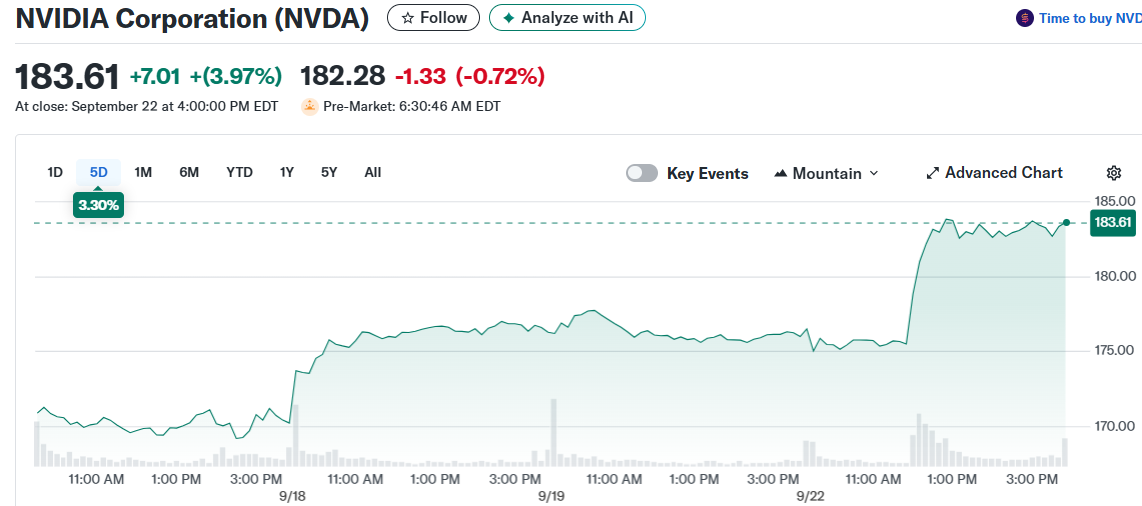TLDR
- Nvidia announced plans to invest up to $100 billion in OpenAI to help build 10 gigawatts of AI data center capacity
- The initial $10 billion investment will fund one gigawatt using Nvidia’s next-generation Vera Rubin chips starting in late 2026
- OpenAI still needs to secure an additional $40 billion per gigawatt from other sources to complete the massive infrastructure build-out
- The deal sparked a global rally in chip stocks, with companies like TSMC, SK Hynix, and Samsung seeing gains
- Questions remain about OpenAI’s corporate structure change, competition effects, and whether Oracle’s revenue forecasts will be supported
Nvidia announced plans to invest up to $100 billion in OpenAI to support the ChatGPT creator’s ambitious expansion of artificial intelligence infrastructure. The unprecedented deal involves Nvidia taking a financial stake in one of its largest customers while supplying millions of AI chips for the project.

The partnership centers on building 10 gigawatts of data center capacity using Nvidia’s technology. This massive scale equals approximately 4 million to 5 million graphics processing units according to Nvidia CEO Jensen Huang.
Nvidia’s initial investment of $10 billion will fund one gigawatt of capacity using the company’s next-generation Vera Rubin chips. The build-out is scheduled to begin in the second half of 2026.
The announcement triggered a global rally in semiconductor stocks. Taiwan Semiconductor Manufacturing Co., which produces chips for Nvidia, closed 3.5% higher in Tuesday trading.
SK Hynix, whose memory chips are used in Nvidia systems, gained more than 2.5%. Samsung also rose 1.4% as markets speculate the company may soon receive approval to supply Nvidia with high-bandwidth memory chips.
European chip stocks followed the positive trend. STMicro, Infineon, and BE Semiconductor all posted gains in early trading.
Funding Gap Remains Large
The deal leaves major funding questions unanswered. Nvidia CEO Jensen Huang previously stated that AI data centers cost about $50 billion per gigawatt to build, with $35 billion going toward Nvidia chips and equipment.
Nvidia’s commitment covers only $10 billion per gigawatt of the total cost. This leaves OpenAI needing approximately $40 billion in additional capital for each gigawatt of planned capacity.
OpenAI has not indicated where it will obtain the remaining funds. The company did not respond to requests for comment about its funding strategy.
The investment structure gives Nvidia no voting power in OpenAI despite its financial stake. The initial $10 billion investment will be made at OpenAI’s current $500 billion valuation.
Corporate Structure Questions
OpenAI operates as a non-profit corporation but is working to convert to a for-profit structure. The company has held discussions with Microsoft about changing to a public benefit corporation overseen by its existing non-profit.
Earlier this month, OpenAI and Microsoft reached a tentative agreement on the conversion. The change still requires approval from officials in Delaware and California.
It remains unclear whether Nvidia will invest in OpenAI’s current non-profit entity or if the investment depends on the corporate restructuring. The companies have not set a timeframe for reaching a definitive agreement.
Competition and Market Effects
The deal raises questions about chip allocation and competition. Nvidia could dedicate a large portion of its in-demand chips to OpenAI while holding a financial stake in the company.
This arrangement may affect chip access for OpenAI competitors like Anthropic or Microsoft. It also impacts AMD’s efforts to compete with Nvidia in selling chips to AI companies.
Oracle’s cloud computing contracts with OpenAI may benefit from the deal. The database company previously announced hundreds of billions in contracts with OpenAI and other large customers.
The Nvidia investment could provide OpenAI with the capital needed to fulfill those Oracle contracts. This development may strengthen Oracle’s revenue forecasts that some analysts had questioned.
The deal represents one of the largest technology partnerships in the AI sector. Neither company has specified when the full 10 gigawatts of capacity will come online or the timeline for the complete $100 billion investment.






